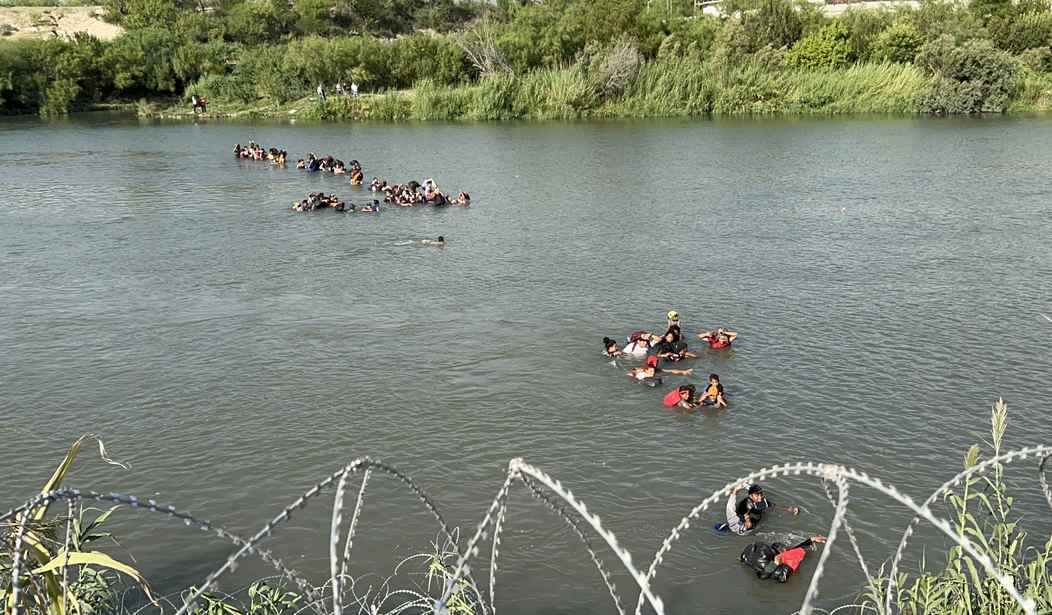With all the attention paid (justifiably) to what may well be the opening rounds of a major war in the Middle East, it's important to remember that we have our own problems closer to home and that the two may even be related. Our uncontrolled southern border is effectively a welcome mat for anyone, from anywhere, who wants to make a low-profile entry into the United States. Panama and Costa Rica recently announced a plan to bus "migrants" through the notorious Darien Gap, essentially speeding them on their way to the southern U.S. border.
Panama and Costa Rica announced a plan to quickly bus thousands of migrants through Panama to the Costa Rican border, as the countries continue to grapple with a steady increase in the number of migrants moving through the jungle-clad Darien Gap.
Panama estimates that 420,700 migrants have crossed the Gap from Colombia to Panama so far this year, making it likely the full-year number will top a half million.
Industrial-scale smuggling operations in Colombia have now reduced the dangerous crossing to a little over two days for the strongest walkers. The expedited bus service in Panama will likely decrease further the amount of time migrants take to reach the U.S. border, now down to about two and a half weeks.
This represents a significant change in the practices previously taken by Panama:
In April, the U.S., Panama and Colombia announced a campaign to slow migration through the Darien jungle, but migrants’ numbers have only grown forcing the Biden administration to seek other options.
The majority of the migrants are from Venezuela, with others from Ecuador, Colombia and Haiti.
The Darien Gap — a gap in the Pan-American Highway, a 19,000-mile road network that links the countries of western South America — is a dangerous place to attempt a crossing. The Gap is largely impassible; mountains, swamps, large rivers, and dense jungle make the area difficult to build roadways through. Estimates are that, by year-end, around half a million people will have made this crossing and proceeded north.
Many of those people have or will enter the United States.
Remember that war in the Middle East?
Recently, my colleague Bob Hoge told us how tens of thousands of "special interest aliens" have been caught trying to enter the United States illegally through that notorious southern border.
New Customs and Border Protection (CBP) data leaked to Fox News only increases the worry, as the numbers reveal that tens of thousands of what the CBP calls "special interest aliens" have been arrested at the southern border since 2021, and many are from the Middle East.
Special interest aliens are people who could pose a threat to the homeland:
"Special interest aliens" are people from countries identified by the U.S. government as having conditions that promote or protect terrorism or potentially pose some sort of national security threat to the U.S.
And only days ago, Jeff Charles informed us that two Iranians, both on the terror watch list, were apprehended at this same southern border.
Two Iranian nationals were captured at the southern border in the past two weeks, according to U.S. Customs and Border Protection (CBP). This is the latest in a series of incidents involving individuals tied to terrorism being apprehended amid the ongoing border crisis.
Now, Panama and Costa Rica intend to make that journey easier.
Granted, Panama and Costa Rica don't want these people around, and that's easy enough to understand if you look at it from their point of view. While most of the illegal migrants come from Venezuela, Columbia, Ecuador, and Haiti, as we've seen, there are plenty of people coming from other parts of the world. And I say again: We don't know who most of these people are, why they are coming, or what their intentions are once they get here.
But here's a thought. This year alone, to date, the United States has distributed these amounts in foreign aid to the countries in question:
- Costa Rica: $9,600,000
- Panama: $10,770,000
- Columbia: $198,080,000
- Venezuela: $15,090,000
- Ecuador: $16,710,000
- Haiti: $265,830,000
That's this year. So far. Those are actual disbursements. That is a total of $516,080,000 this year, so far, who are shoveling illegal migrants toward the United States as fast as they can move them along.
One would think that, in the interests of our economy, in the interests of our national sovereignty, in the interests of our national security, and, for crying out loud, in the interest in the safety of our citizens, we would make that money contingent on those countries' efforts to reduce illegal migration, not to expedite it.
The House of Representatives holds the checkbook. They could implement this through the budget process. (I'm not sure what we are supposed to be getting in return for all this money anyway.) But the Democrats seem unwilling to take any action to prevent the flow of illegal migrants, and while the GOP talks a good game, they have only a razor-thin margin in the House to do anything about it — they can't even seem to elect a Speaker — and the Senate and the President won't allow any such action either.
It may well take a Hamas-style terror attack on our own soil, perpetrated by people who came through the open southern border, to prompt any real action. Where our border is concerned, things are evidently going to have to get worse before they get better.













